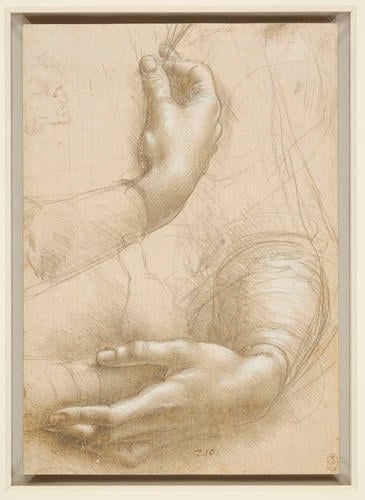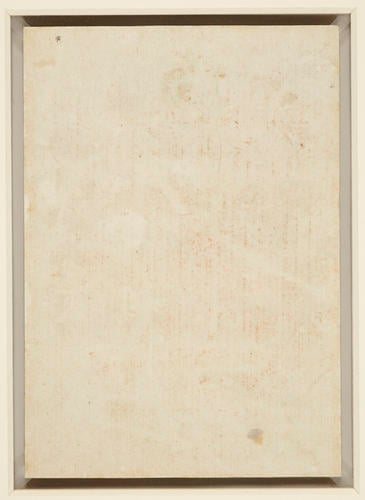-
1 of 253523 objects
A study of a woman's hands c.1490
Charcoal, metalpoint, white heightening, on pale pinkish-buff prepared paper | 21.5 x 15.0 cm (sheet of paper) | RCIN 912558
-
A study of a woman's hands folded over her breast. The right hand is holding an object between the finger and thumb. Below is a study of folded hands. In the upper right area there is a slight sketch of a grotesque head in profile to the right. Melzi's number 210.
This is not a study of two hands held one above the other, but two separate studies of crossed hands, each study concentrating on one hand only, with the other as a mere outline. The uppermost hand may be holding something, perhaps a flower or a ring. The drawing has often been connected with Leonardo’s portrait of Ginevra de’ Benci of the mid-1470s (Washington, D.C., National Gallery of Art), which is cut down and probably once included the sitter’s hands. The style of the drawing is however significantly later than that painting, with a combination of strong searching outlines and rapid but controlled parallel hatching, characteristic of Leonardo’s metalpoint drawings of around 1490.
Like RCIN 912513, this sheet may have been preparatory for the portrait of Cecilia Gallerani (A Lady with an Ermine, National Museum, Krakow). It is likely that Leonardo had been contemplating the prominent, active role of her hands from the outset – two sketches in RCIN 912513 show the model with her left arm akimbo or her arms folded. The hands here do not correspond in pose with those in the painting, but they are identical in type, slender and elegant, and it is quite possible that the drawing was an early study for the portrait, before the decision was taken to introduce the ermine.
Text adapted from Leonardo da Vinci: A life in drawing, London, 2018Provenance
Bequeathed to Francesco Melzi; from whose heirs purchased by Pompeo Leoni, c.1582-90; Thomas Howard, 14th Earl of Arundel, by 1630; probably acquired by Charles II; Royal Collection by 1690
-
Creator(s)
Acquirer(s)
-
Medium and techniques
Charcoal, metalpoint, white heightening, on pale pinkish-buff prepared paper
Measurements
21.5 x 15.0 cm (sheet of paper)

